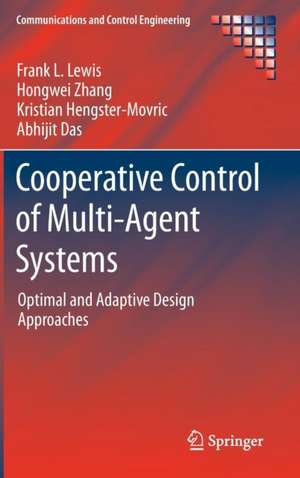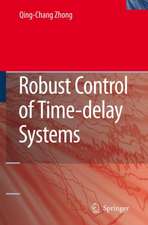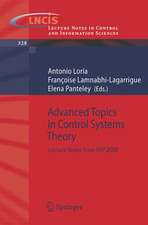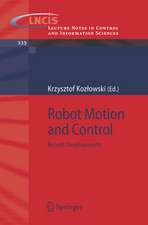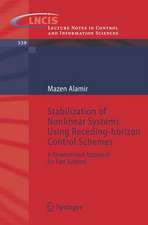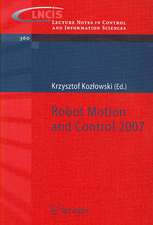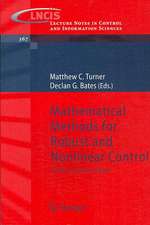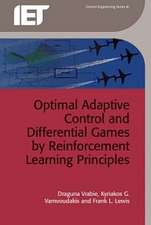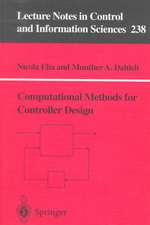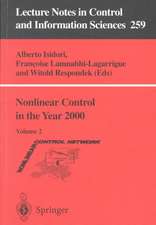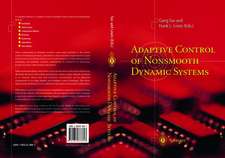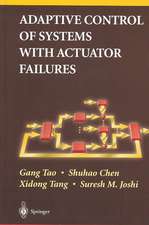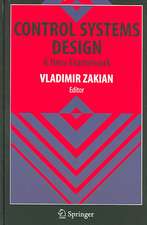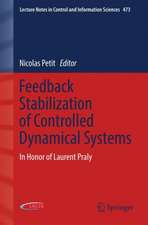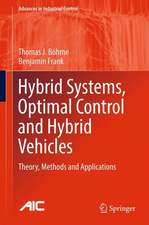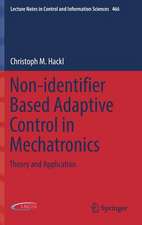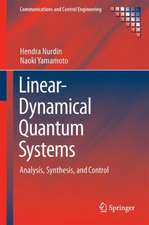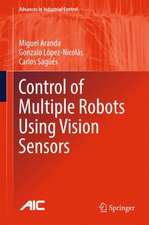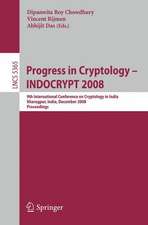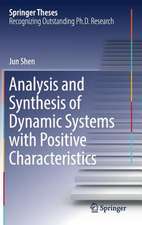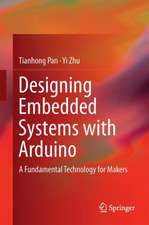Cooperative Control of Multi-Agent Systems: Optimal and Adaptive Design Approaches: Communications and Control Engineering
Autor Frank L. Lewis, Hongwei Zhang, Kristian Hengster-Movric, Abhijit Dasen Limba Engleză Hardback – 21 ian 2014
Each control methodology proposed is developed by rigorous proofs. All algorithms are justified by simulation examples. The text is self-contained and will serve as an excellent comprehensive source of information for researchers and graduate students working with multi-agent systems.
| Toate formatele și edițiile | Preț | Express |
|---|---|---|
| Paperback (1) | 1109.29 lei 6-8 săpt. | |
| SPRINGER LONDON – 23 aug 2016 | 1109.29 lei 6-8 săpt. | |
| Hardback (1) | 1119.38 lei 6-8 săpt. | |
| SPRINGER LONDON – 21 ian 2014 | 1119.38 lei 6-8 săpt. |
Din seria Communications and Control Engineering
- 18%
 Preț: 953.65 lei
Preț: 953.65 lei - 18%
 Preț: 953.65 lei
Preț: 953.65 lei - 18%
 Preț: 1128.08 lei
Preț: 1128.08 lei - 20%
 Preț: 879.71 lei
Preț: 879.71 lei - 18%
 Preț: 1117.03 lei
Preț: 1117.03 lei - 15%
 Preț: 659.70 lei
Preț: 659.70 lei - 15%
 Preț: 656.89 lei
Preț: 656.89 lei - 18%
 Preț: 896.52 lei
Preț: 896.52 lei - 18%
 Preț: 1113.26 lei
Preț: 1113.26 lei - 18%
 Preț: 1388.22 lei
Preț: 1388.22 lei - 15%
 Preț: 647.27 lei
Preț: 647.27 lei - 18%
 Preț: 954.45 lei
Preț: 954.45 lei - 18%
 Preț: 1231.47 lei
Preț: 1231.47 lei - 18%
 Preț: 948.92 lei
Preț: 948.92 lei - 18%
 Preț: 1232.57 lei
Preț: 1232.57 lei - 15%
 Preț: 643.34 lei
Preț: 643.34 lei - 18%
 Preț: 1127.28 lei
Preț: 1127.28 lei - 18%
 Preț: 1401.30 lei
Preț: 1401.30 lei - 15%
 Preț: 651.51 lei
Preț: 651.51 lei - 20%
 Preț: 1454.07 lei
Preț: 1454.07 lei - 18%
 Preț: 948.79 lei
Preț: 948.79 lei - 18%
 Preț: 1233.06 lei
Preț: 1233.06 lei - 18%
 Preț: 947.85 lei
Preț: 947.85 lei - 18%
 Preț: 950.96 lei
Preț: 950.96 lei - 18%
 Preț: 956.99 lei
Preț: 956.99 lei - 15%
 Preț: 644.18 lei
Preț: 644.18 lei - 18%
 Preț: 946.87 lei
Preț: 946.87 lei - 18%
 Preț: 951.14 lei
Preț: 951.14 lei - 18%
 Preț: 961.55 lei
Preț: 961.55 lei - 15%
 Preț: 644.18 lei
Preț: 644.18 lei - 20%
 Preț: 990.80 lei
Preț: 990.80 lei - 18%
 Preț: 1006.72 lei
Preț: 1006.72 lei - 18%
 Preț: 942.44 lei
Preț: 942.44 lei - 18%
 Preț: 1233.06 lei
Preț: 1233.06 lei - 15%
 Preț: 641.85 lei
Preț: 641.85 lei - 18%
 Preț: 957.75 lei
Preț: 957.75 lei - 15%
 Preț: 649.87 lei
Preț: 649.87 lei - 18%
 Preț: 958.07 lei
Preț: 958.07 lei - 18%
 Preț: 1117.99 lei
Preț: 1117.99 lei - 18%
 Preț: 1395.94 lei
Preț: 1395.94 lei - 18%
 Preț: 781.62 lei
Preț: 781.62 lei - 18%
 Preț: 953.20 lei
Preț: 953.20 lei - 18%
 Preț: 1109.78 lei
Preț: 1109.78 lei - 18%
 Preț: 947.35 lei
Preț: 947.35 lei
Preț: 1119.38 lei
Preț vechi: 1365.11 lei
-18% Nou
Puncte Express: 1679
Preț estimativ în valută:
214.19€ • 223.63$ • 177.27£
214.19€ • 223.63$ • 177.27£
Carte tipărită la comandă
Livrare economică 04-18 aprilie
Preluare comenzi: 021 569.72.76
Specificații
ISBN-13: 9781447155737
ISBN-10: 1447155734
Pagini: 354
Ilustrații: XX, 307 p. 80 illus., 59 illus. in color.
Dimensiuni: 155 x 235 x 20 mm
Greutate: 0.75 kg
Ediția:2014
Editura: SPRINGER LONDON
Colecția Springer
Seria Communications and Control Engineering
Locul publicării:London, United Kingdom
ISBN-10: 1447155734
Pagini: 354
Ilustrații: XX, 307 p. 80 illus., 59 illus. in color.
Dimensiuni: 155 x 235 x 20 mm
Greutate: 0.75 kg
Ediția:2014
Editura: SPRINGER LONDON
Colecția Springer
Seria Communications and Control Engineering
Locul publicării:London, United Kingdom
Public țintă
ResearchCuprins
Introduction to Synchronization in Nature and Physics and Cooperative Control for Multi-agent Systems on Graphs.- Algebraic Graph Theory and Cooperative Control Consensus.- Part I Distributed Optimal Design for Cooperative Control in Multi-agent Systems on Graphs.- Local Optimal Design for Cooperative Control in Multi-agent Systems on Graphs.- Riccati Design for Synchronization of Discrete-Time Systems.- Cooperative Globally Optimal Control for Multi-agent Systems on Directed Graph Topologies.- Graphical Games: Distributed Multi-player Games on Graphs.- Part II Distributed Adaptive Control for Multi-agent Cooperative Systems.- Graph Laplacian Potential and Lyapunov Functions for Multi-agent Systems.- Cooperative Adaptive Control for Systems with First-Order Nonlinear Dynamics.- Cooperative Adaptive Control for Systems with Second-Order Nonlinear Dynamics.- Cooperative Adaptive Control for Higher-Order Nonlinear Systems.
Notă biografică
Frank L. Lewis (S’78-M’81-SM’86-F’94), Fellow IEEE, Fellow IFAC, Fellow UK Institute of Measurement and Control, Professional Engineer Texas, UK Chartered Engineer, is Distinguished Scholar Professor and Moncrief-O’Donnell Chair at University of Texas at Arlington’s Automation & Robotics Research Institute. He obtained his PhD at Georgia Tech. He received the Fulbright Research Award, NSF Research Initiation Grant, ASEE Terman Award, Int. Neural Network Soc. Gabor Award 2009, UK Inst Measurement & Control Honeywell Field Engineering Medal 2009. Received Outstanding Service Award from Dallas IEEE Section, selected as Engineer of the year by Ft. Worth IEEE Section. Received the 2010 IEEE Region 5 Outstanding Engineering Educator Award and the 2010 UTA Graduate Dean’s Excellence in Doctoral Mentoring Award. He served on the NAE Committee on Space Station in 1995. He is an elected Guest Consulting Professor at South China University of Tech. and Shanghai Jiao Tong University. Founder Member of the Board of Governors of the Mediterranean Control Assoc. Helped win the IEEE CSS Best Chapter Award (as Founding Chairman of DFW Chapter), the National Sigma Xi Award for Outstanding Chapter (as President of UTA Chapter), and the US SBA Tibbets Award in 1996 (as Director of ARRI’s SBIR Program). He is author of 6 US patents, 222 journal papers, 47 chapters and encyclopedia articles, 333 refereed conference papers, and 14 books. His current research interests include distributed control on graphs, neural and fuzzy systems, intelligent control, wireless sensor networks, nonlinear systems, robotics, condition-based maintenance, microelectro-mechanical systems (MEMS) control, and manufacturing process control. Hongwei Zhang (S’10-M’11) received his PhD from the Department of Mechanical and Automation Engineering, the Chinese University of Hong Kong in 2010. From July 2009 to December 2010, he was a visiting scholar and subsequently a postdoctoralresearcher at the Automation and Robotics Research Institute of the University of Texas at Arlington, Texas, USA. He is now with the Department of Electronic Engineering, the City University of Hong Kong, as a postdoctoral researcher. He is the author of 1 book (in Chinese), 1 book chapter and several refereed journal papers. He is a regular reviewer for several refereed journals and conferences, including Automatica, Systems & Control Letters, IEEE Trans. Neural Netw., IEEE Trans. Syst. Man Cybern. B, Cybern., IEEE Trans. Ind. Electron., IEEE Conf. Decision Control and Int. Joint Conf. Neural Netw., among others. His current research interests includes cooperative control of multi-agent systems, neural adaptive control, receding horizon control, optimal control and approximate dynamic programming (ADP). Abhijit Das received his PhD degree from The University of Texas at Arlington in 2010, all in Electrical Engineering. From 2003 to 2006 he was involved with several projects with Defense Research and Development Organization (DRDO), India. In 2007, he joined Automation and Robotics Research Institute as a Research Assistant. His Ph.D. dissertation won Dean Dissertation Fellowship award in 2010. He is the author of 1 book, 3 book chapters and several journal and conference articles. He is life member of Systems Soc. of India, student member of AIAA, IEEE, SIAM. His profile is also appeared in Marquis Who’s Who in America. His research interests are cooperative control of multi-agent systems and neural network for control. Kristian Hengster-Movric received his MS degree from the Faculty of Electrical Engineering and Computing, University of Zagreb, (Zagreb, Croatia) in 2009. He was awarded Rector's Prize for work related to his master thesis. From 2009 he is a PhD student at the University of Texas at Arlington, and is associated with the Automation and Robotics Research Institute (ARRI). In 2010 he became a member of Golden Key International Honour Societyfor his academic achievements.
Textul de pe ultima copertă
Task complexity, communication constraints, flexibility and energy-saving concerns are all factors that may require a group of autonomous agents to work together in a cooperative manner. Applications involving such complications include mobile robots, wireless sensor networks, unmanned aerial vehicles (UAVs), spacecraft, and so on. In such networked multi-agent scenarios, the restrictions imposed by the communication graph topology can pose severe problems in the design of cooperative feedback control systems. Cooperative control of multi-agent systems is a challenging topic for both control theorists and practitioners and has been the subject of significant recent research.
Cooperative Control of Multi-Agent Systems extends optimal control and adaptive control design methods to multi-agent systems on communication graphs. It develops Riccati design techniques for general linear dynamics for cooperative state feedback design, cooperative observer design, and cooperative dynamic output feedback design. Both continuous-time and discrete-time dynamical multi-agent systems are treated. Optimal cooperative control is introduced and neural adaptive design techniques for multi-agent nonlinear systems with unknown dynamics, which are rarely treated in literature are developed. Results spanning systems with first-, second- and on up to general high-order nonlinear dynamics are presented.
Each control methodology proposed is developed by rigorous proofs. All algorithms are justified by simulation examples. The text is self-contained and will serve as an excellent comprehensive source of information for researchers and graduate students working with multi-agent systems.
The Communications and Control Engineering series reports major technological advances which have potential for great impact in the fields of communication and control. It reflects research in industrial and academic institutions around the world so that thereadership can exploit new possibilities as they become available.
Cooperative Control of Multi-Agent Systems extends optimal control and adaptive control design methods to multi-agent systems on communication graphs. It develops Riccati design techniques for general linear dynamics for cooperative state feedback design, cooperative observer design, and cooperative dynamic output feedback design. Both continuous-time and discrete-time dynamical multi-agent systems are treated. Optimal cooperative control is introduced and neural adaptive design techniques for multi-agent nonlinear systems with unknown dynamics, which are rarely treated in literature are developed. Results spanning systems with first-, second- and on up to general high-order nonlinear dynamics are presented.
Each control methodology proposed is developed by rigorous proofs. All algorithms are justified by simulation examples. The text is self-contained and will serve as an excellent comprehensive source of information for researchers and graduate students working with multi-agent systems.
The Communications and Control Engineering series reports major technological advances which have potential for great impact in the fields of communication and control. It reflects research in industrial and academic institutions around the world so that thereadership can exploit new possibilities as they become available.
Caracteristici
Gives the reader convenient Riccati-based design techniques for a various forms of control with single- to high-order dynamics Demonstrates the reliability of the methods described with rigorous stability analysis and detailed control design algorithms Self-contained providing the reader with solid background and comprehensive cutting-edge research in the same source Includes supplementary material: sn.pub/extras
